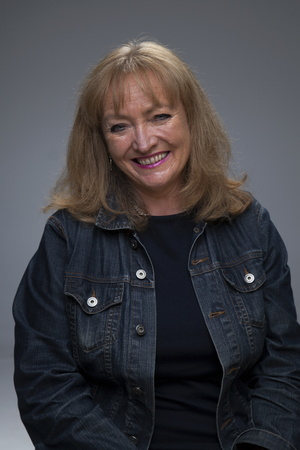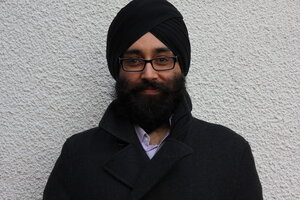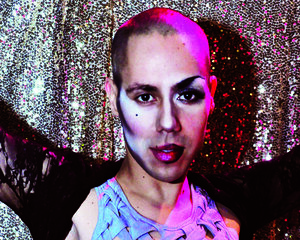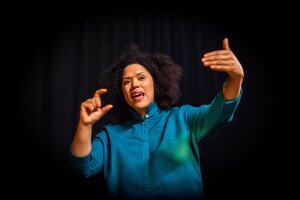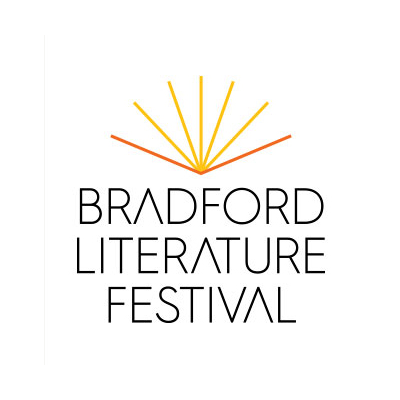Stereotyped as a city of industry and mills, Bradford’s long history of art and writing can easily be overlooked. Three Faces of Bradford refocuses our gaze, with an exclusive screening of three short films made between 1975 and 1980 from the BBC Arena archives. Highlighting artists David Hockney and David Oxtoby and playwright Andrea Dunbar, the documentaries capture their distinctive individual creativity yet also their shared Bradford roots.
Here, you can still watch responses to the Arena film from four Bradfordians noted for their contributions to the arts today: Bradford Community Broadcasting director Mary Dowson, artist Mick Manning, actor Kat Rose-Martin and scriptwriter Tajinder Singh Hayer. Read and listen to new poems from Yorkshire poets Adam Lowe and Rommi Smith and then try your hand at writing your local memoirs, with a masterclass from author Monique Roffey.

THREE FACES OF BRADFORD
ARENA: Décor by David Hockney (Director: Colin Nears, 1975)
ARENA: The King and I – David Oxtoby (Director: Alan Lewens, 1979)
ARENA: Andrea Dunbar (Director: Nigel Williams, 1980)
These three films were made quite independently of each other and date from the early days of Arena. The Hockney film appeared in the very first edition, when Arena was a magazine programme addressing topical subjects in the arts before it became a series of single films on single subjects.
The three films tell very different stories, yet combining them reveals common ground. The three protagonists certainly all confirm Yorkshire’s famous reputation for straight talking but, most of all, they share an uncompromising commitment to their own particular vision.
For Dunbar, her writing is an affirmation of herself, it confronts deprived and straitened circumstances in her own life. Oxtoby has adopted another world, the one he entered in his teens; he’s an adept in the wild and unruly church of true rock ‘n’ roll. Hockney has enjoyed incomparable success. He quickly became the darling of the art world and the transatlantic media, as well as being that rare phenomenon, an artist as popular as he is feted by the critics. He approaches the uncharted territory of high opera with characteristic assurance and charm.
Hockney has always said exactly what he thinks – about smoking, whether the great classic painters of old could draw as well as we thought, his sexuality – but central to it all is his own artistic vision. He seems ever intrigued by the possibilities art holds for him. That’s exactly how he approaches the new challenge of designing sets for the opera.
The Rake’s Progress – music by Stravinsky, libretto co-written by WH Auden, based on Hogarth, staged at Glyndebourne – this is high art and high life. In every respect it’s at the other end of the spectrum from Arbor, Andrea Dunbar’s play. At Arena we never privileged one over the other. Incorporating both the high and the popular has been, perhaps, Arena’s most defining characteristic.
With little to go on but her own young life, Dunbar tells the story of a teenage girl who becomes pregnant and how she deals with it. The script, unforgiving and unsentimental, is worthy of Ken Loach. The film was directed by my colleague, the dramatist and author Nigel Williams. “The honesty and directness of her writing was irresistible,” he told me, “She was an amazing natural writer. She’d had one advantage — encouragement from her drama teacher at her comprehensive who told her she could write. He recognised her talent as I hope did I.”
Dunbar’s art is rooted in life, Oxtoby’s is rooted in thrills and glory. The effect of American rock ‘n’ roll on the youth of the depressed post-war Britain of the 1950s cannot be overestimated. The late John Peel, a man of Oxtoby’s age, observed that the first time he heard Little Richard, he realised “a quantum leap had taken place in the history of mankind.”
Like Peter Blake, his contemporary at the Royal College of Art, Oxtoby is an unabashed fan (Hockney was at the RCA at the same time). That devotion spawned British Pop Art. While the Beatles, the Stones and others tried to emulate Little Richard, Jerry Lee Lewis and Chuck Berry in music, Oxtoby did it in paint. His skill is as easy as his manner — confident, humorous and dedicated.
Three faces, three different voices — one Bradford.
Anthony Wall
26 May 2020
Responses
A film of responses from Mary Dowson, Mick Manning, Kat Rose-Martin and Tajinder Singh Hayer.
Responding to the film
Poetry
Poetic responses from Adam Lowe and Rommi Smith
Commissioned poets
Masterclass
With Monique Roffey
Interviews

